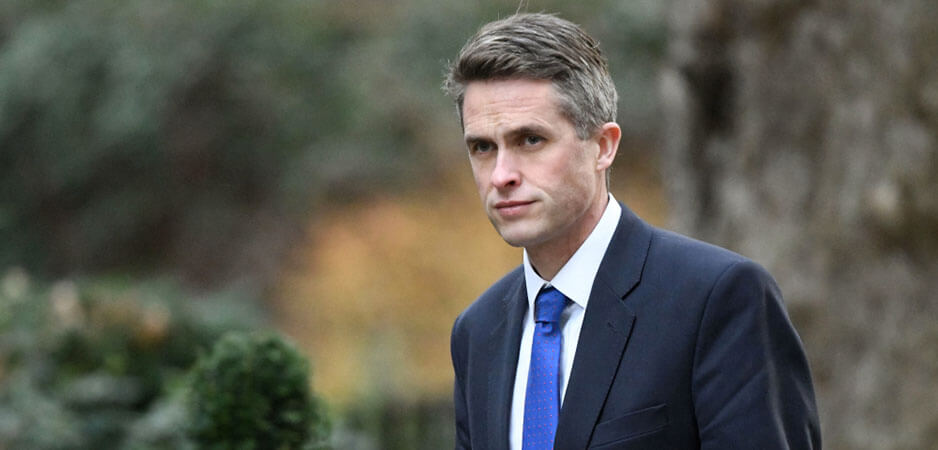Gavin Williamson, the UK defense secretary, will turn a liberated Britain into a lethal weapon. The Daily Devil’s Dictionary explains.
Whereas nearly every commentator has been emphasizing the likely negative and disastrous consequences of Brexit — including penuries of food and medicine, the devaluation of the pound and massive unemployment — Defense Secretary Gavin Williamson has reassured the British public and the world at large, insisting there will also be positive outcomes.
The minister has already begun jubilating: “Brexit has brought us to a great moment in our history. A moment when we must strengthen our global presence, enhance our lethality and increase our mass.”
Here is today’s 3D definition:
Lethality:
The ability to kill and destroy, an attribute usually applied to unscrupulous enemies and cited in the interest of improving one’s own security, but in the minds of some politicians, the key to governing other people through submission and thus enforcing their own particular notion of justice
Contextual note
Williamson calls this “a great moment in our history” and speaks of “our global presence.” Does this confirm that the driving force behind Brexit was nothing more than the nostalgia of a lost empire?
In his words, “‘[G]lobal Britain’ needs to be much more than a pithy phrase. It is about action.” Then he defines what he means by action: “[A]ction to oppose those who flout international law; and action, on occasion, that may lead to us intervene ourselves.” In other words, no longer policed by Europe, the UK will be free to rival or partner with the US as the world’s policeman. Some may find it reassuring that the two cops responsible for the new world order speak English and will have no trouble coordinating their policies and “actions.” Others may worry.
This may reveal two possible ways that hard Brexiteers see the world. The first evokes the vision of a tight and globally dominant military alliance with the US aimed at restructuring the defunct British Empire as a division of the still existing — but declining — American empire. The second sounds more far-fetched: Aware that the US empire is breaking apart, the UK, with its centuries of experience dominating vast regions across the globe, would be in a position to step up to take the leadership that the Americans are about to lose. Williamson described the future UK as “the nation that people turn to when the world needs leadership.”
If ever proof was needed that the dominant form of capitalism that now prevails in the West — from the US to Europe and Israel in the Middle East — is what should be called “military-industrial socialism,” Williamson’s discourse not only provides it, but seals the case.
Though he reveals nothing more of his true intentions than his belief in a speculative “swarm squadron of drones,” Williamson speaks not from a sense of nostalgia, but with cynical economic realism. Today’s economy, for any elite nation capable of managing it, not only rewards but requires the production of weaponry and military technology on an ever-expanding scale. It’s no coincidence that the permanent members of the UN Security Council as well as Germany lead the list of weapons exporters.
 Arms production serves no less than six purposes: it reinforces the power of the government over its own population; creates industrial employment in nations that have lost most of their traditional manufacturing; funds research in technology that can be conveniently transferred to private industry; invisibly socializes a broad sector of the economy, since it’s the public who pay through taxes while under the impression that it’s for their security; enables the exporting nation to wield diplomatic power over the regimes that purchase the weapons; and improves the balance of trade.
Arms production serves no less than six purposes: it reinforces the power of the government over its own population; creates industrial employment in nations that have lost most of their traditional manufacturing; funds research in technology that can be conveniently transferred to private industry; invisibly socializes a broad sector of the economy, since it’s the public who pay through taxes while under the impression that it’s for their security; enables the exporting nation to wield diplomatic power over the regimes that purchase the weapons; and improves the balance of trade.
Politicians find all these factors not only seductive, but important for their own electoral purposes. They receive funding from the military-industrial sector, and this gives them the opportunity to lobby for military-linked industry activity in their districts, pleasing their electorate by creating jobs.
But there is a flip side. The nation itself becomes not just dependent on, but addicted to a military economy. If it doesn’t have enemies, it will need to create them. That not only distorts the economy and weakens democracy itself, but also makes the world a more dangerous place. It even renders economic activity not related to the military more fragile and precarious. But for people in government and numerous industries, it works.
Historical note
The year 2016 gave us Brexit and the election of Donald Trump. These events appear to have sparked a return to the mentality of the Cold War, an era that saw the growth of a military-industrial complex that expanded in response to the ominous threats — real or imaginary — of the nuclear age.
Williamson now tells us that NATO, a Cold War creation, must “develop its ability to handle the kind of provocations that Russia is throwing at us.” The metaphor of “throwing” evokes the launching of nuclear missiles, though he merely mentions “provocations.” The Guardian seems to adopt the same logic, evoking “the poisoning of Sergei and Yulia Skripal in Salisbury, which Moscow is widely suspected of orchestrating.” Does a nation deploy its “lethality” and “mass” against another nation for attempting to assassinate one of its dissidents abroad? If that is true, The Guardian should consider Saudi Arabia as a priority before Russia. But, of course, as newspaper itself has pointed out elsewhere, the UK sells weapons to Saudi Arabia, notably to pursue Crown Prince Mohammed bin Salman’s very lethal war in Yemen.
English culture has traditionally embraced the value of “fair play.” The history of the British Empire shows us that this ideal was “more honor’d in the breach than the observance,” though the British genius in devising the rules of sports proves that the culture retains a certain abstract predilection for “level playing fields.” There’s little doubt that with the right degree of “lethality,” a Britain free of the constraints of Europe might once again have the means of flattening the landscape in certain places of its choice.
*[In the age of Oscar Wilde and Mark Twain, another American wit, the journalist Ambrose Bierce, produced a series of satirical definitions of commonly used terms, throwing light on their hidden meanings in real discourse. Bierce eventually collected and published them as a book, The Devil’s Dictionary, in 1911. We have shamelessly appropriated his title in the interest of continuing his wholesome pedagogical effort to enlighten generations of readers of the news.]
The views expressed in this article are the author’s own and do not necessarily reflect Fair Observer’s editorial policy.
Support Fair Observer
We rely on your support for our independence, diversity and quality.
For more than 10 years, Fair Observer has been free, fair and independent. No billionaire owns us, no advertisers control us. We are a reader-supported nonprofit. Unlike many other publications, we keep our content free for readers regardless of where they live or whether they can afford to pay. We have no paywalls and no ads.
In the post-truth era of fake news, echo chambers and filter bubbles, we publish a plurality of perspectives from around the world. Anyone can publish with us, but everyone goes through a rigorous editorial process. So, you get fact-checked, well-reasoned content instead of noise.
We publish 2,500+ voices from 90+ countries. We also conduct education and training programs
on subjects ranging from digital media and journalism to writing and critical thinking. This
doesn’t come cheap. Servers, editors, trainers and web developers cost
money.
Please consider supporting us on a regular basis as a recurring donor or a
sustaining member.
Will you support FO’s journalism?
We rely on your support for our independence, diversity and quality.






